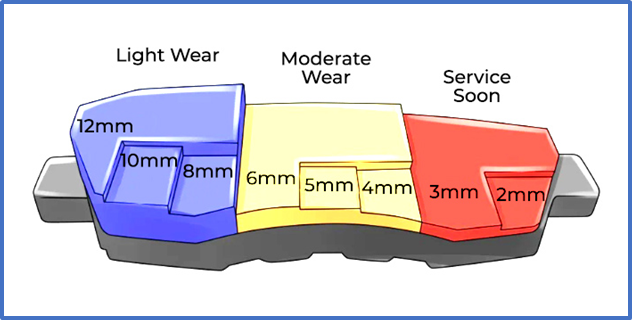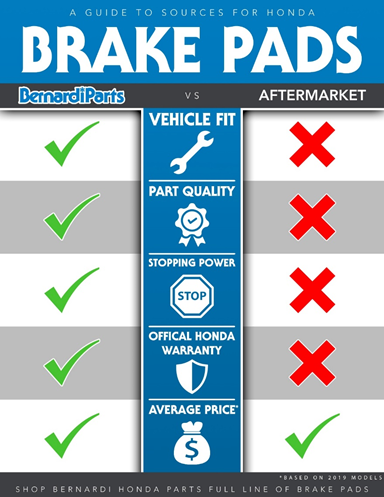Knowing when to change brake pads is necessary for maintaining the safety and efficiency of your vehicle. Driving with worn-out brake pads increases your vehicle's maintenance costs and poses significant risks, increasing the likelihood of accidents. Below, we'll discuss key indicators that signify it's time to replace your brake pads, potentially saving you money and, more importantly, keeping you safe on the road.

Signs Your Brake Pads Need Replacement
Every time you use your brakes, the brake pads apply pressure to the brake rotors, causing your wheels to stop. Over time, that friction wears away small amounts of material from your brake pads. As your brake pads wear down, they get thinner and eventually need to be replaced as part of the normal maintenance of your vehicle. Your car’s manufacturer suggested maintenance plan can tell you how many miles you might expect your brake pads to last, but driving conditions can make a big difference. Bridgestone Tires has a great set of pointers that give a bit more information on some warning signs. Haynes, the database of car and scooter manuals, has a couple of additional pointers to help you troubleshoot your brake problems.
Here’s what to look out for:
Squealing Noises
One of the first signs of worn brake pads is a squealing or screeching sound when applying the brakes. This noise typically comes from the brake wear indicator, a small metal component designed to give you an audible alert when pad replacement is necessary.
Brake Pad Depth
Regularly check the thickness of your brake pads through the spokes of your wheel. If the pad depth is less than 4mm, it falls into the 'Service Soon' category, indicating that replacement is imminent. Refer to the visual guide below to assess your brake pads accurately.
Deep Grinding Metal Sound
Hearing a deep grinding or growling sound during braking is an urgent warning. Such noises suggest that the brake pads have worn down completely, causing direct metal-to-metal contact, which can quickly damage your brake rotors.
Vibrating Brake Pedal
A vibrating or unsteady brake pedal often indicates worn brake pads. This vibration or 'soft' feeling is due to uneven surfaces on the pads, which reduce braking efficiency.
Brake Warning Indicator Light
Most Honda vehicles are equipped with a 'BRAKE' indicator light on the dashboard, which illuminates when there's a problem within the brake system. If this light remains on after you've disengaged the parking brake, it's advisable to get your vehicle inspected.
Vehicle Pulling to The Side
If your car pulls to one side while braking, it may be due to uneven brake pad wear or a stuck caliper. It's essential to check both the brake pad thickness and caliper function to avoid this potentially dangerous issue. Haynes has a great tutorial on precisely measuring brake pad thickness.
How Often to Replace Brake Pads?
Brake pad lifespan can vary significantly based on your driving style and conditions. Typically, brake pads need replacement every 25,000 to 60,000 miles, but more frequent changes may be necessary for vehicles frequently driven in stop-and-go traffic or heavy urban areas.
Replacing Your Brake Pads
If the troubleshooting steps above helped you confirm that your brake pads are worn down, the next step is to replace them before there’s any permanent damage to your vehicle. Bernardi Parts has everything you need to switch out your brake pads with only genuine Honda OEM parts.

To find the right parts for your Honda, click this link to open our homepage in a new browser window and then follow along with this video to select your model, year, and trim package.
Conclusion
Knowing when to change brake pads and addressing them promptly extends the lifespan of related vehicle components and safeguards your driving experience. If you notice any of the symptoms mentioned, consider replacing your brake pads soon to maintain optimal vehicle performance and safety.
Don't wait for the warning signs to become more severe. Check your brake pads today, and contact us or visit our maintenance tips section for further assistance. Need help or prefer professional service? Book an appointment with our certified mechanics by calling 800-924-1884 or visiting our service page. For more information on this, or for help finding the right OEM Honda parts for your vehicle, feel free to send us a message or give us a call at 800-924-1884.
Related Articles